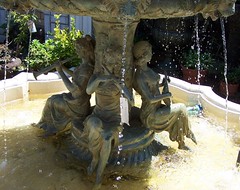Life at Jeff Street
Jeff Street Baptist Community at Liberty. It's a confusing mouthful for a group that might better be known as the Church, formerly of Jeff Street, formerly Baptists (and Catholics, Presbyterians and given-up-hope) which is now at Liberty, literally and figuratively. We are a mutt. The wretched refuse. The divine community. God's Kingdom come. Welcome. [Disclaimer: The views within this blog are doubtless pretty cool. Nonetheless, views expressed are those of the individual and not Jeff Street.]
Sunday, June 18, 2006
Hospitality to Strangers and Immigration, Part I
“Hospitality to Strangers” is a moral practice that pervades Scripture from Genesis to Revelation. This practice was vital to the survival of the wandering nomadic clans from which the various tribes of Habiru came that would come to be the “Hebrews” who settled in Canaan.
Genesis 15, famous for reassuring Abram of offspring and the faithfulness of God to the covenant, also gives the less than reassuring promise, “Know this for certain, that your offspring shall be aliens in a land that is not theirs, and shall be slaves there, and they shall be oppressed for many years, but I will bring judgment on the nation that they serve, and afterward they shall come out with many possessions.” (15:13-14).
To be aliens in a land not yours—the lot of most refugees and immigrants around the world and through the centuries. Slavery and other forms of oppression follow naturally from that vulnerable refugee state—as any glance at migrant workers will tell you.
Genesis 19, the Sodom story, is not about “homosexuality,” but about the terrible crime of inhospitality to strangers—something considered grossly immoral throughout the Ancient Near East, not just in Hebrew tradition. The men of Sodom, all of them, not the few gay men who might live there, threaten the angelic strangers with gang rape—which then as now was the ultimate way that males humiliated other males or women. Lot’s offer of his virgin daughters (which would have made no sense if he was besieged by gay men), as horrible as it rightly sounds to us, was motivated by his determination to respect the rules of hospitality and do everything in his power to protect the strangers under his roof.
Later, in the giving of the Torah at Sinai, the Israelites are reminded to offer hospitality and justice to resident aliens “because you know the heart of the alien, for you were aliens in the land of Egypt.” Even in the Christmas narratives of the Gospels we find that Mary and Joseph, forced by the whims of empire to travel late in her pregnancy, must seek hospitality as homeless strangers in an Innkeeper’s cave. In Matthew’s version, after the visit of the Magi, the Holy Family become refugees seeking hospitality in Egypt until it is safe to return to Nazareth.
When Jesus sends out his disciples two by two, they are to expect hospitality and the early church practiced hospitality to all strangers, but especially to itinerant missionaries. I could multiply these illustrations of a major biblical theme beyond count. Yet, when it comes to thinking about immigration today, those U.S. Christians who most want politicians to decide all questions based on the Bible appear to have forgotten the biblical practice of hospitality to strangers. I confess that this topic touches me personally because of my own family history.
On my father’s side we are from Ireland and, like so many others, we came to this country in the 1880s when Ireland was experiencing severe famine and U.S. expansionists were promising “free land.” (No one told us that the Native Americans would consider the land theirs and object to our living there! The bigwig politicos didn’t really care if the settlers were killed—they were only Irish—but the Irish were “white enough” to be an excuse then to send in the military to wipe out yet another Native American nation. Once again, we were pawns in others’ power plays.)
When my ancestor, Sean Bhain and his wife and five kids arrived, however, they were told that the Irish immigration quota was filled that year. The boat was sent to Halifax, Nova Scotia. But Sean and his family sneaked into the U.S. and then, to be certain they weren’t caught, changed their last name by translating the Irish “Bhain” to its English equivalent “White.” Yes, I am a descendant of illegal immigrants. (From a Native American viewpoint, nearly all of us are the descendants of illegal immigrants, although in the case of African Americans the Middle Passage abductions could hardly be called by such a voluntary-sounding term as “immigration.”)
We didn’t find much hospitality at Ellis Island, but once in the country, we were welcomed far more than immigrants from Eastern or Southern Europe, not to mention those from China who were arriving about the same time! Doubtless much of our ease in assimilation came from already knowing English (since bloody Brits had dominated us so thoroughly for so long). And, unlike most Irish immigrants, Sean Bhain (turned Sean White) didn’t attract the hostility of late 19th C. “Nativists” by being Catholic. My family were composed, even that far back, mostly of Methodists and Baptists. That was another reason than the famine to leave—whether the English-loving Anglican Loyalists were dominant or the Republican Catholics, dissenting Free Church folk were going to be marginalized.
But, in America, we would find it easier since Methodists and Baptists were the fastest-growing denominations of the day and, at that time, Catholics were a distinct minority who were seen as a threat to democracy and Protestant America. So, we not only survived, but largely prospered—and, like so many immigrants, became so thoroughly “American” that Ireland became only a place of old stories, a place we might wish to visit (but none of us has), a land with vague connections to us—but no longer home. America became home and the White family thrived.
But America benefited too. Of all the nations in the world, only Canada is as much an immigrant society as the U.S. Immigrants built this country, but each wave of immigration has been met with hostility and fear. America has greatly benefited from immigration, but has too seldom been grateful. Our current attitude is so very far from “hospitable” that we should change the inscription on Lady Liberty (herself a Frenchwoman, you know!) from “Give me your tired, your poor, your huddled masses yearning to breathe free, the wretched refuse of your teeming shore. Send these, the homeless, tempest tossed, to me. I lift my lamp beside the golden door” to something like “No vacancies!” Shameful.
And it is all justified by the supposed burden that immigrants are supposed to be on the economy—a convenient scapegoat for incompetent government policies of rewarding the rich at the expense of the common good.
======
by Michael the Leveller, with yet more to come...
Hospitality to Strangers and Immigration, Part II
The latest Sojourners Magazine uses data from the Justice for Immigrants website (http://www.justiceforimmigrants.org/ ) to explode the myths about immigration with the cold light of truth:
Myth: Immigrants, at least, illegal immigrants, don’t pay taxes. False. Even undocumented immigrants pay taxes: income taxes, property taxes, sales taxes, and other taxes at the local, state, and federal levels. The Social Security Administration has a “suspense file” of FICA taxes that cannot be matched to workers’ names and Social Security Numbers—evidence of the taxes paid by undocumented workers using fake names. That suspense file grew by $20 billion between 1990 and 1998, the last year for which data was released to the public.
Myth: Immigrants come to the U.S. to take welfare. No one who sees how poor our welfare system is could believe that. If someone was going to emigrate in order to take advantage of the social safety net, they would be far better off going to Canada where health care is free! In fact, the ratio of immigrant use of public benefits in the U.S. and the amount of taxes they pay is consistently favorable to the U.S. In one estimate, immigrant tax payments total $20-30 billion MORE than the amount of government services they use.
Myth: Immigrants send all their money back to their home countries. False. Certainly “remittances” or payment to relatives back home amounts to a considerable amount in many cases, and some poor nations depend heavily on such remittances from relatives in rich Western nations. But, in addition to all the consumer spending that immigrants do, immigrant households and immigrant businesses contribute $162 billion in tax revenues to federal, state, and local governments in the U.S.
Myth: Immigrants take jobs and opportunities away from U.S. citizens. This is probably the favorite scare tactic of politicians, but the largest wave of immigration in the U.S. since the early 1900s coincided with the lowest national unemployment rate and the fastest economic growth.
Myth: Immigrants are a drain on the U.S. economy. The net benefit of immigration to the U.S. is nearly $10 billion annually.
Myth: Immigrants don’t want to learn English or become “real Americans.” Within 10 years of arrival, more than 75% of immigrants speak fluent English. Moreover, demand for adult-level English classes far exceeds supply. We don’t need an “official language” or other discriminatory laws to be sure that English continues to be learned. Only in the U.S., moreover, does the average person seem totally fearful of ever learning more than one language. Further, immigrants learn American history faster and more thoroughly than most who are born here—while Americans stubbornly refuse to learn much about the rest of the world.
Myth: Immigration in the past was great because the country needed more population. But now we have simply become too crowded and the percentage of immigrants is greater than ever before. False. The portion of the U.S. population that is foreign-born now stands at 11.5 % whereas in the early 20th C. it was approximately 15%.
Myth: Most immigrants cross the border illegally. Well, my family did. And the U.S.-Mexico border used to be far different. Texas, Arizona, New Mexico, Utah, Colorado, Nevada, and California were all once Northwest Mexico. But, in fact, around 75% of all immigrants have legal permanent (immigrant) visas. Of the 15% who are undocumented, 40% have not snuck across any border, but simply overstayed temporary (non-immigrant) visas.
Myth: Weak U.S. border enforcement has led to high levels of undocumented immigration. Look, the way to decrease illegal immigration is to solve the terrible political, economic, and other problems in countries of origin that lead desperate people to try anything to get to the promise of a better life in America. From 1986 to 1998, the Border Patrol’s budget increased six-fold, and the number of agents stationed on the U.S.-Mexico border doubled to 8,500. During the same period, the undocumented immigrant population also doubled to 8 million. One reason for the problem has been mentioned. Another is that a dwindling number of legal avenues for immigrants to enter the U.S., compared with the number of jobs in need of workers, has led many to seek unofficial ways into the country.
Myth: The so-called “war on terrorism” can be won through immigration restrictions. This myth seems popular even with Democrats, and even with some otherwise progressive and justice-oriented Democrats! But, since 9/11, the many measures targeting immigrants in the name of national security have resulted in ZERO terrorism prosecutions. In fact, several of these measures could have the opposite effect and actually make us less safe from attack, since targeted communities of immigrants are afraid to come forward with information they may have overheard.
So, since the “practical case for immigration restriction” is mythical, and the history of this nation and most of our families is the history of a country built on immigrant labor, immigrant hopes, immigrant dreams, and immigrant talent and ingenuity, why don’t we tune out the harsh, cruel sounds of anti-immigrant bigotry and re-introduce ourselves to the biblical traditions of hospitality to strangers? I suggest that it is past time for such a move.
======
by Michael the Leveller, who just recently restarted his blog, Levellers.
Sunday, June 04, 2006
Pentecostal Power
Pentecostal power has little to do with
exaggerated religious emotion. But
such power, when granted,
has everything to do
with passion, with conviction.
It’s not your head that
you lose—it’s your heart,
which falls head-over-heels
in love with the vision of dry bones
re-sinewed and aspired to life.
When such power erupts, they
probably will call you crazy.
“Have you lost your mind?!”
Yes, we will say, because
these days the mind has
become acclimated to a culture
of war; has become inured to
the ravages of poverty in a culture
of obesity; has become numb
to ecological wreckage.
When Pentecostal power erupts, all
heaven’s gonna’ break loose.
The boundaries will be compromised;
barriers will be broken; and
borders will be breached.
Economies of privilege will be fractured
and the politics of enmity will be impeached.
The revenge of the Beloved is the
reversal of
“I will pour out my Spirit,”
says the LORD: Poured out
not for escape to another
world beyond the sky but
here, amid the dust. Poured out
not on disembodied spirits but
“upon all flesh.” It is to the
agony of abandonment that Heaven
is aroused. Queer the One Who
fashions a future for the disfavored.
The groaning of creation is both
an ache and an assurance. We
dare not insulate ourselves from
the one, lest we be deafened to
the other. Birth is at work.
Though the labor is prolonged,
provision is tendered.
Pentecostal power is the wherewithal
by which we wager our lives on
the surety of this promise.
======
by Baptist Peacemaker Ken Sehested
Pentecost Sunday, 4 June 2006




